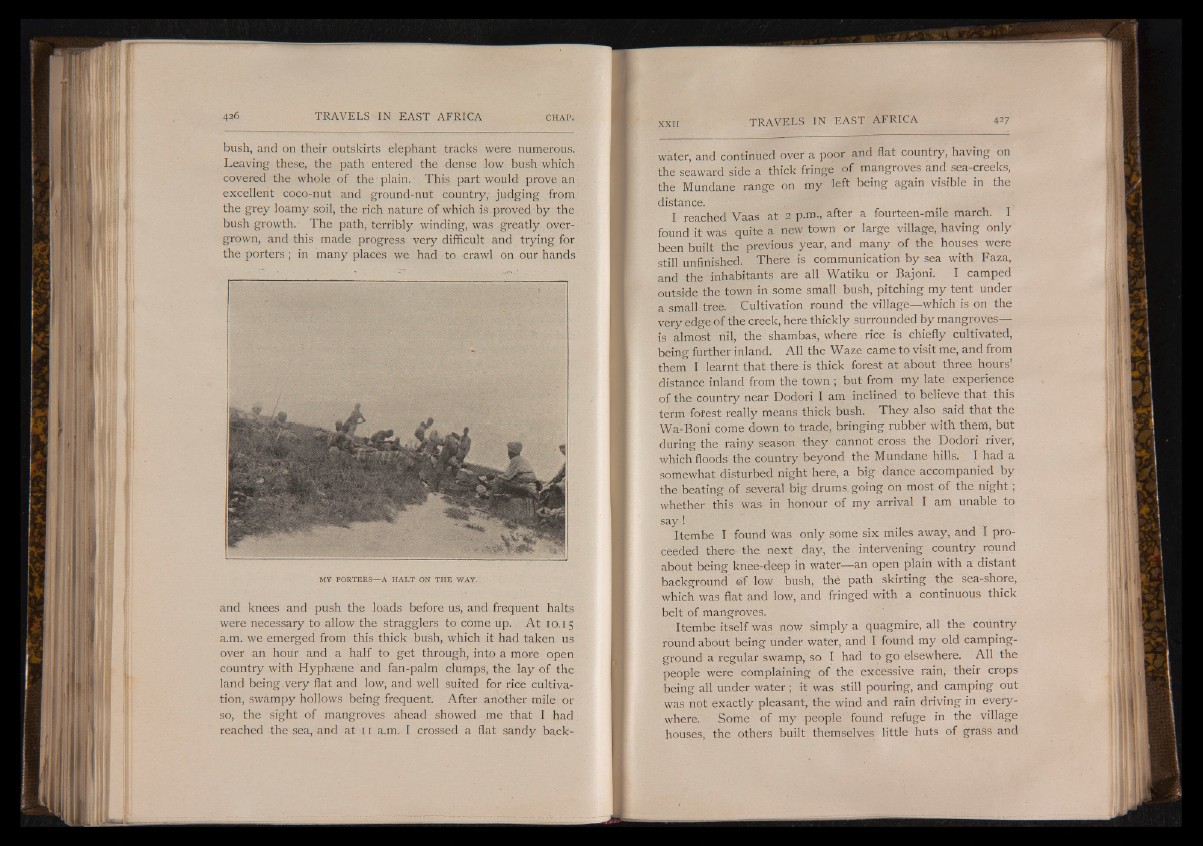
bush, and on their outskirts elephant tracks were numerous.
Leaving these, the path entered the dense low bush which
covered the whole of the plain. This part Would prove an
excellent coco-nut and ground-nut country, judging from
the grey loamy soil, the rich nature of which is proved by the
bush growth. The path, terribly winding, was greatly overgrown,
and this made progress very difficult and trying for
the porters ; in many places we had to crawl on our hands
MY PORTERS— A HALT ON THE WAY.
and knees and push the loads before us, and frequent halts
were necessary to allow the stragglers to come up. A t 10.15
a.m. we emerged from this thick bush, which it had taken us
over an hour and a half to get through, into a more open
country with Hyphsene and fan-palm clumps, the lay of the
land being,very flat and low, and well suited for rice cultivation,
swampy hollows being frequent. After another mile or
so, the sight of mangroves ahead showed me that I had
reached the sea, and at 11 a.m. I crossed a flat sandy backwater,
and continued over a poor and flat country, having on
the seaward side a thick fringe of mangroves and sea-creeks,
the Mundane range on my left being again visible in the
distance. .
I reached Vaas at 2 p.m., after a fourteen-mile march. I
found it was quite a new town or large village, having only
been built the previous year, and many of the houses were
still unfinished. There is communication by sea with Faza,
and the inhabitants are all Watiku or Bajoni. I camped
outside the town in some small bush, pitching my tent under
a small tree. Cultivation round the village— which is on the
very edge of the creek, here thickly surrounded by mangroves—
is almost nil, the shambas, where rice is chiefly cultivated,
being further inland. All the Waze came to visit me, and from
them I learnt that there is thick forest at about three hours’
distance inland from the town ; but from my late experience
of the country near Dodori I am inclined to believe that this
term fofest really means thick bush. They also said that the
Wa-Boni come down to trade, bringing rubber with them, but
during the rainy season they cannot cross the Dodori river,
which floods the country beyond the Mundane hills. I had a
somewhat disturbed night here, a big dance accompanied by
the beating of several big drums, going on most of the night ;
whether this was in honour of my arrival I am unable to
say !
Itembe I found was only some six miles away, and I proceeded
there the next day, the intervening country round
about being knee-deep in water— an open plain with a distant
background ©f low bush, thè path skirting the sea-shore,
which was flat and low, and fringed with a continuous thick
belt of mangroves.
Itembe itself was now simply a quagmire, all the country
round about being under water, and I found my old camping-
ground a regular swamp, so I had to go elsewhere. All the
people were complaining of the excessive rain, their crops
being all under water ; it was still pouring, and camping out
was not exactly pleasant, the wind and rain driving in everywhere.
Some of my people found refuge in the village
houses, the others built themselves little huts of grass and